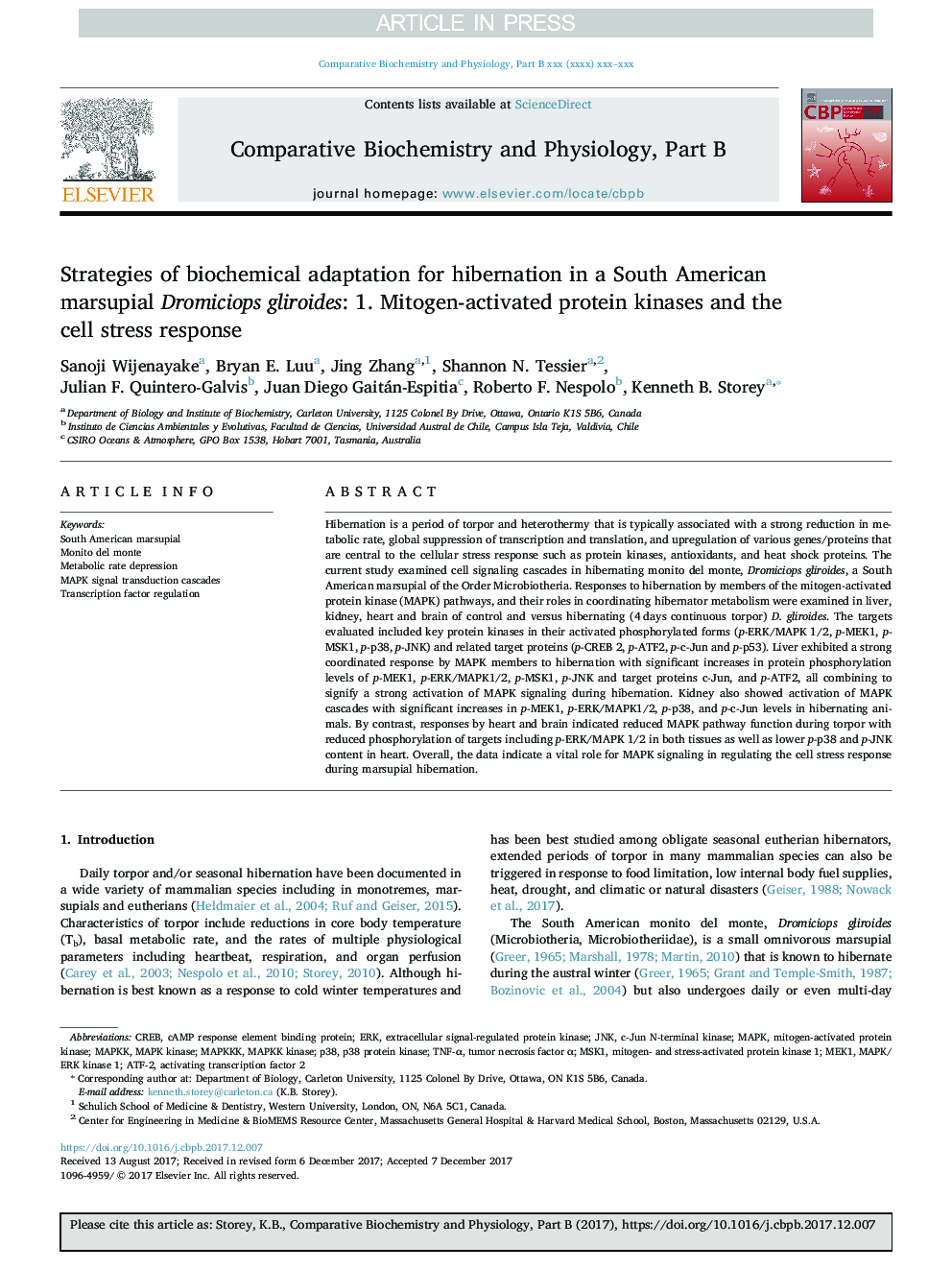| کد مقاله | کد نشریه | سال انتشار | مقاله انگلیسی | نسخه تمام متن |
|---|---|---|---|---|
| 8318770 | 1539113 | 2018 | 7 صفحه PDF | دانلود رایگان |
عنوان انگلیسی مقاله ISI
Strategies of biochemical adaptation for hibernation in a South American marsupial Dromiciops gliroides: 1. Mitogen-activated protein kinases and the cell stress response
دانلود مقاله + سفارش ترجمه
دانلود مقاله ISI انگلیسی
رایگان برای ایرانیان
کلمات کلیدی
CREBMAPKKKMitogen- and stress-activated protein kinase 1MAPKKATF-2MEK1MSK1MAPK/ERK kinase 1MAPKK kinasep38transcription factor regulationERKJnkc-Jun N-terminal kinase - C-Jun N-terminal kinaseMAPK - MAPKMAPK kinase - MAPK کینازMetabolic rate depression - افسردگی متابولیکtumor necrosis factor α - تومور نکروز عامل αTNF-α - فاکتور نکروز توموری آلفاactivating transcription factor 2 - فعال کردن عامل رونویسی 2cAMP response element binding protein - پروتئین اتصال دهنده عنصر پاسخ cAMPmitogen-activated protein kinase - پروتئین کیناز فعال با mitogenExtracellular signal-regulated protein kinase - پروتئین کیناز کنترل شده سیگنال غیر سلولی
موضوعات مرتبط
علوم زیستی و بیوفناوری
بیوشیمی، ژنتیک و زیست شناسی مولکولی
زیست شیمی
پیش نمایش صفحه اول مقاله

چکیده انگلیسی
Hibernation is a period of torpor and heterothermy that is typically associated with a strong reduction in metabolic rate, global suppression of transcription and translation, and upregulation of various genes/proteins that are central to the cellular stress response such as protein kinases, antioxidants, and heat shock proteins. The current study examined cell signaling cascades in hibernating monito del monte, Dromiciops gliroides, a South American marsupial of the Order Microbiotheria. Responses to hibernation by members of the mitogen-activated protein kinase (MAPK) pathways, and their roles in coordinating hibernator metabolism were examined in liver, kidney, heart and brain of control and versus hibernating (4Â days continuous torpor) D. gliroides. The targets evaluated included key protein kinases in their activated phosphorylated forms (p-ERK/MAPK 1/2, p-MEK1, p-MSK1, p-p38, p-JNK) and related target proteins (p-CREB 2, p-ATF2, p-c-Jun and p-p53). Liver exhibited a strong coordinated response by MAPK members to hibernation with significant increases in protein phosphorylation levels of p-MEK1, p-ERK/MAPK1/2, p-MSK1, p-JNK and target proteins c-Jun, and p-ATF2, all combining to signify a strong activation of MAPK signaling during hibernation. Kidney also showed activation of MAPK cascades with significant increases in p-MEK1, p-ERK/MAPK1/2, p-p38, and p-c-Jun levels in hibernating animals. By contrast, responses by heart and brain indicated reduced MAPK pathway function during torpor with reduced phosphorylation of targets including p-ERK/MAPK 1/2 in both tissues as well as lower p-p38 and p-JNK content in heart. Overall, the data indicate a vital role for MAPK signaling in regulating the cell stress response during marsupial hibernation.
ناشر
Database: Elsevier - ScienceDirect (ساینس دایرکت)
Journal: Comparative Biochemistry and Physiology Part B: Biochemistry and Molecular Biology - Volume 224, October 2018, Pages 12-18
Journal: Comparative Biochemistry and Physiology Part B: Biochemistry and Molecular Biology - Volume 224, October 2018, Pages 12-18
نویسندگان
Sanoji Wijenayake, Bryan E. Luu, Jing Zhang, Shannon N. Tessier, Julian F. Quintero-Galvis, Juan Diego Gaitán-Espitia, Roberto F. Nespolo, Kenneth B. Storey,